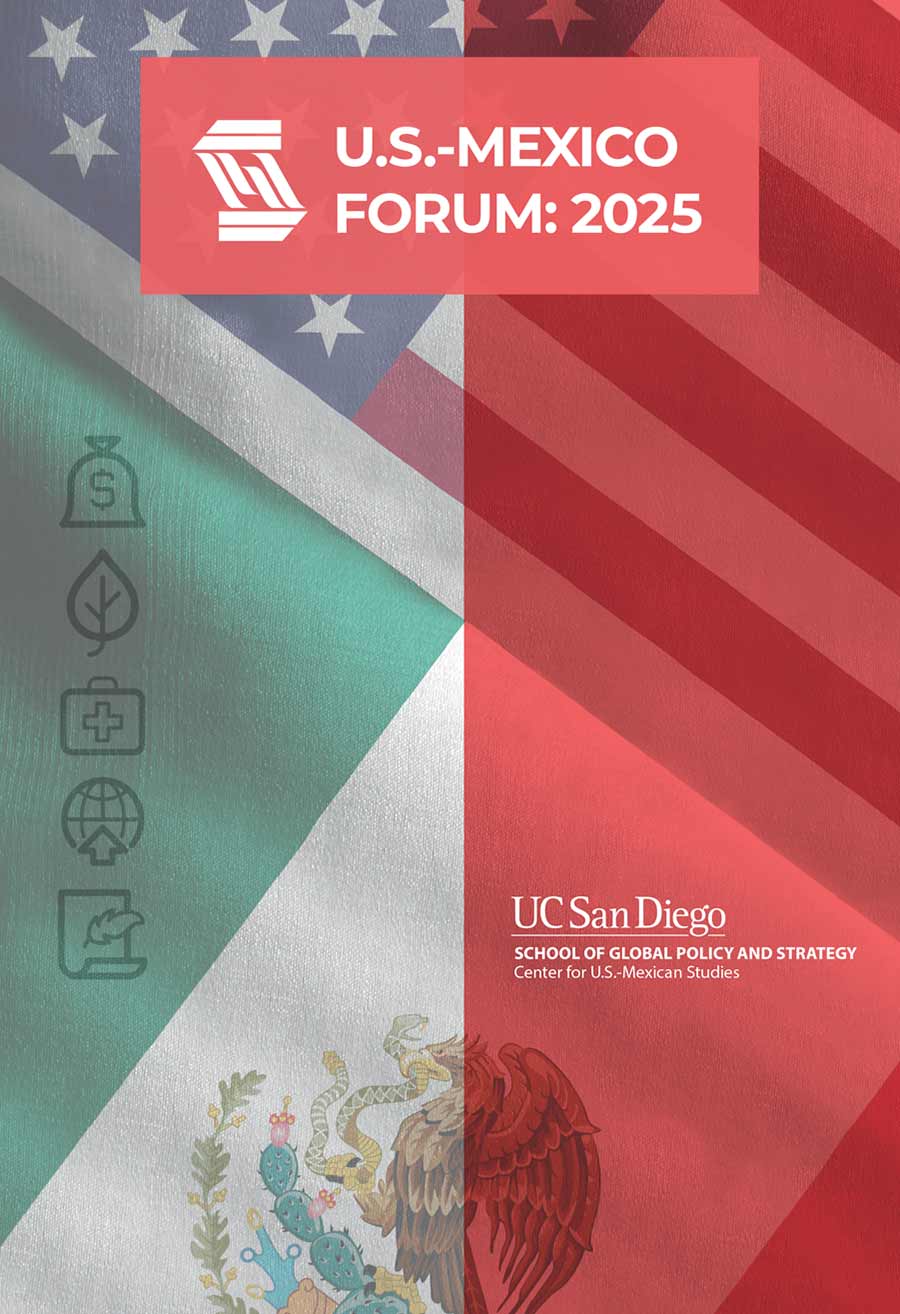
UC San Diego’s U.S.-Mexico Forum 2025 Taps into Potential of Cross-Border Collaboration
The Forum provides the Biden and López Obrador administrations with policy recommendations on trade and economy, energy and sustainability, strategic diplomacy, migration, and security and public health
Published Date
By:
- Jade Griffin
Share This:
Article Content
Recent world events, including the election of President Joe Biden, the global COVID-19 pandemic and more, have many wondering, “What’s next on the world stage?”
Researchers at the Center for U.S.-Mexican Studies (USMEX) at the University of California San Diego took the opportunity at this pivotal juncture to rethink the relationship between Mexico and the U.S. The team, housed in the UC San Diego School of Global Policy and Strategy, worked to create the U.S.-Mexico Forum 2025, comprised of a group of USMEX researchers, Mexican and U.S. scholars, practitioners and experts. The Forum’s report proposes a course for bilateral U.S.-Mexico relations during the four years (2021-2025) when Biden and Mexico’s Andrés Manuel López Obrador will concurrently hold their presidencies.
“The Forum’s aim is to encourage cooperation between both countries and to avoid, as much as possible, the frictions that can emerge in a relationship as intense, complex and asymmetric as the one between the U. S. and Mexico,” said Rafael Fernandez de Castro, professor and director of the Center for U.S.-Mexican Studies. “We cannot leave the processes of bilateral integration to the whims of market forces or simple fate.”
On March 3, the Mexican Senate, in partnership with the Mexican Congress Channel, will host a virtual presentation of the U.S.-Mexico Forum 2025. This presentation is geared towards Senators and staffers of Mexico’s Senate, specifically members of the following six committees: North America, U.S.-Mexico-Canada Agreement, Foreign Affairs, Migration, Energy and Public Health.
“The U.S.-Mexico Forum 2025 has been an extraordinary effort to imagine what could be achieved in the bilateral relationship over the next four years,” said Silvia Giorguli, professor and president of El Colegio de Mexico, which also participated in the initiative. “I deeply appreciate UC San Diego’s commitment to undertaking this project and creating a new binational network.”

The U.S.-Mexico Forum 2025 consisted of five working groups: trade and economy, energy and sustainable development, strategic diplomacy, migration, security and public health. Each group created a white paper that discusses the state of affairs in 2020, sets aspirations for 2025 and identifies a strategy for achieving those goals. Forum members will meet regularly over the next three years.
“While each group focused on their respective areas of expertise, overarching themes of cooperation and coordination emerged throughout the process,” said Cecilia Farfán-Méndez, head of Security Research Programs at the Center for U.S.-Mexican Studies and co-author of the Forum’s Security and Public Health report. “Ultimately, more positive U.S.-Mexico relations would have an impact on the lives of North American citizens.”
Collectively, the Forum participants suggested that both federal governments should make a conscious and deliberate effort to enhance U.S.-Mexico relations, with benefits to citizens on both sides of the border. Specifically, three consensus conclusions emerged from the Forum’s discussions.
First, Biden’s arrival to the White House represents an important window of opportunity to deepen cooperation between the two countries. Authors argue that Biden is a leader who knows Mexico well, and who sees the bilateral relationship as one of enormous potential. On a visit to Mexico City in 2016, Biden was quoted as saying, “This is about what we can do with Mexico. I mean that sincerely. We need you as much as I hope you think you need us.”
Second, the report suggests that President López Obrador and his diplomatic team will still need to take the initiative and capitalize on the goodwill and knowledge of Biden’s team, and ensure that their experience with Mexico serves to help resolve issues, such as the partial closure of the border.
Lastly, authors agree that the United States-Mexico-Canada Agreement (USMCA) is the central instrument for coordinating economic and commercial interactions between the countries. According to forum contributors, respecting USMCA clauses and prioritizing its implementation is essential to moving the bilateral relationship forward.
“The Forum is a tremendously novel effort not only to produce policy papers but to create an ongoing network of experts who are dedicated to deepening the bilateral relationship,” said Michael Lettieri, senior fellow for human rights at the Center for U.S.-Mexican Studies. “It is a project that has the potential to impact policymaking far beyond the next four years.”
For the full report, click here. For more information about the Center for U.S.-Mexican Studies, go to usmex.ucsd.edu.
Share This:
You May Also Like
Stay in the Know
Keep up with all the latest from UC San Diego. Subscribe to the newsletter today.



